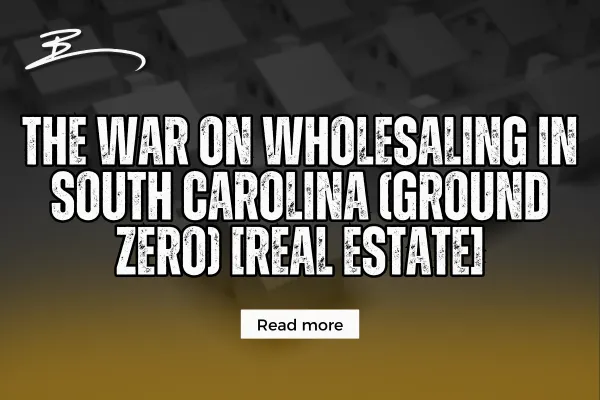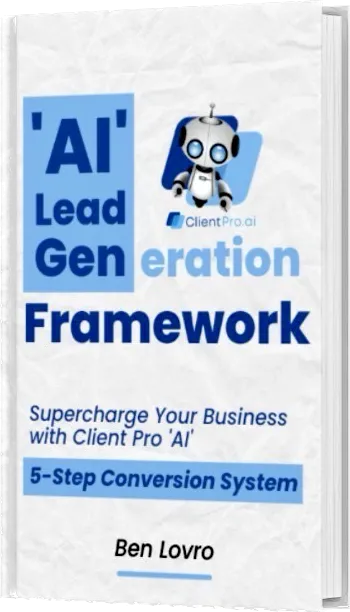Ben Lovro Blogs
AI' Client Conversion Framework

The WAR on Wholesaling in South Carolina
If you're in the real estate game, you know that South Carolina has always been a fertile ground for opportunities. People are moving to the Palmetto State because of its varied landscape, strong economy, and friendly southern hospitality. But lately, a brewing storm on the horizon has emerged: the war on wholesaling in South Carolina.
Wholesaling real estate involves finding a property, signing a contract, and selling that contract to an investor or buyer. First, you need to locate a property that you believe has potential for profit. Next, you negotiate and sign a contract with the seller to purchase the property at a certain price. Finally, you sell that contract to an investor or buyer who will then take over the purchase of the property.
This process allows you to make a profit without actually purchasing the property yourself. You are essentially acting as a middleman between the property owner and the final buyer. Many new real estate entrepreneurs use this strategy to enter the market without needing a lot of money.
However, recent legislative and market changes have made wholesaling more challenging than ever before. Let’s delve into what’s happening, why it matters, and how you can navigate these turbulent waters.
Understanding Wholesaling
Before we get into the nitty-gritty of the current landscape, let's cover the basics. Wholesaling real estate involves four main steps:
Finding a Deal: Scouring the market for undervalued properties. This could be distressed homes, foreclosures, or properties owned by motivated sellers.
Getting it Under Contract: Once you find a deal, you negotiate a contract with the seller. This contract gives you the right to purchase the property at a specified price.
Your goal is to sell this contract to another buyer, typically a real estate investor, in order to make a profit.
Closing the Deal: The investor buys the property, and you make money from the difference between your contract price and the sale price.
This strategy makes real estate investing accessible to many people. It provides the opportunity to earn a significant amount of money. However, the game is changing in South Carolina.
The Legislative Crackdown
One of the significant shifts we’re seeing is the legislative crackdown on wholesaling. South Carolina lawmakers are noticing wholesaling practices and are working to regulate the industry more strictly. The rationale behind this is a number of things:
Consumer Protection: There have been instances where sellers, often in distress, were taken advantage of by unscrupulous wholesalers. To protect these consumers, lawmakers are tightening the reins.
Market Stability: Wholesaling, particularly in hot markets, can drive up property prices, contributing to economic issues. By regulating wholesaling, the goal is to maintain market stability and low prices.
Transparency: Ensuring that all transactions are above board and transparent is a priority. This includes proper disclosures and adherence to real estate laws and ethics.
Key Legislative Changes
Licensing Requirements
One of the most impactful changes is the introduction of licensing requirements for wholesalers. Previously, anyone could engage in wholesaling without a real estate license. Now, South Carolina mandates that individuals engaging in wholesaling activities must obtain a real estate license. This makes sure wholesalers know the basics of real estate law and ethics, and that a governing body supervises them.
Disclosure Obligations
New disclosure obligations have been implemented to protect sellers. Wholesalers must now fully disclose their intentions and their profit margins to sellers. This transparency helps sellers understand their property's true value and the transaction details.
Contract Regulations
Contracts have come under scrutiny as well. In South Carolina, contracts for wholesaling transactions must now have certain language and clauses to protect everyone involved. These include clear terms on assignment rights, the wholesaler’s intentions, and timelines.
Market Implications
These legislative changes are sending ripples through the South Carolina real estate market. For seasoned wholesalers and newcomers alike, it's a time of adaptation. But what does this mean for the broader market of homes for sale in South Carolina?
Reduced Wholesaling Activity
The immediate impact is a reduction in wholesaling activity. Some wholesalers are leaving the market or changing their real estate tactics. This is especially true for those operating on the edge of the law. This reduction could lead to fewer off-market deals and a slight cooling in the investor-driven segment of the market.
Increased Property Listings
With fewer wholesalers flipping contracts, more properties might hit the Multiple Listing Service (MLS). This can be good news for traditional buyers looking for homes for sale in South Carolina. More listings mean more choices, and potentially, more competitive pricing.
Stabilized Prices
As wholesaling activities decrease, one could expect a slowing down of property prices. Wholesalers often operate in distressed markets, buying low and selling slightly higher to investors. This practice, in large volumes, can inflate property values. With tighter regulations, the market could see a more balanced price appreciation.
Navigating the New Landscape
For those looking to thrive in this new environment, adaptability is key. Here are some strategies to consider:
Get Licensed
If you’re serious about wholesaling, getting your real estate license is a must. Not only does it keep you compliant with the new laws, but it also opens up more opportunities. A license lets you use the MLS, connect with real estate pros, and build trust with both sellers and buyers.
Embrace Transparency
Embrace the spirit of the new regulations by being fully transparent in your dealings. Good communication and ethical behavior will help you avoid legal issues and create trust with clients and partners. Being transparent can help sell your products by showing customers you care about their needs and interests.
Diversify Your Strategies
Don’t rely solely on wholesaling. Diversify your real estate strategies to include fix-and-flip, buy-and-hold, or even traditional brokerage services. This strategy can provide multiple revenue streams and help you weather market fluctuations.
Leverage Technology
Use technology to your advantage. Many tools and platforms can help you find deals, manage contracts, and market properties more effectively. Staying ahead of the tech curve can give you a competitive edge in a regulated market.
The Role of Wholesale Real Estate Companies
Wholesale real estate companies in South Carolina are also feeling the pinch. These companies, which often operate on a larger scale than individual wholesalers, need to navigate the new regulations carefully. They must ensure that they license all their agents and that they comply with the new laws in their business practices.
Adapting Business Models
Many wholesale real estate companies are adapting their business models to stay compliant. This might involve restructuring their operations, investing in training for their agents, and implementing more robust compliance protocols.
Collaboration with Traditional Realtors
Some wholesale real estate companies are forging closer ties with traditional realtors. Working with licensed real estate professionals can help ensure that transactions are compliant. They also provide access to the broader market knowledge and networks that traditional realtors offer.
The Future of Wholesaling in South Carolina
In South Carolina, the focus is on regulating wholesaling to promote fairness, transparency, and market stability, rather than eliminating it altogether. For those willing to adapt, the future still holds significant opportunities.
Education and Advocacy
Education and advocacy will be crucial. Wholesalers and wholesale real estate companies should keep up with legislative changes and support fair regulations. Engaging with real estate associations and participating in industry discussions can help shape the future landscape.
Commitment to Ethical Practices
A commitment to ethical practices will set successful wholesalers apart from the rest. By prioritizing integrity, transparency, and fairness, wholesalers can build strong reputations and long-term success.
Focus on Value
Ultimately, the focus should be on providing value. Wholesalers who prioritize value will always find opportunities. They can help homeowners in need, offer investors good deals, or support the stability of the housing market.
Conclusion
The war on wholesaling in South Carolina signifies a pivotal moment for the real estate industry in the state. While the new regulations present challenges, they also offer opportunities for those willing to adapt and evolve. Wholesalers can succeed in the market by obtaining licenses, being transparent, utilizing various strategies, embracing technology, and practicing ethical behavior.
The homes for sale in South Carolina, wholesale real estate listings, and wholesale real estate companies are all changing. But change, as they say, is the only constant. Real estate agents in South Carolina can succeed by staying informed, flexible, and dedicated to best practices. This will help the real estate market thrive for years to come.
Contact Us

Bet On Yourself
Empowering entrepreneurs and real estate investors with the tools they need to scale.
ben@clientpro.ai
(803) 921-9915
100 Old Cherokee Road ste f 342





